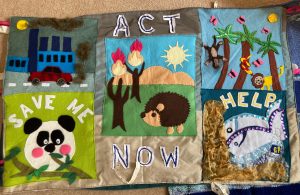Nerys writes: Today, church looks quite different from usual. The congregation will be surrounded by panels like the one below crafted by knitters, crocheters and embroiderers from all around the UK, reminding us that it is time to make big changes to stop the devastating climate havoc and ecological breakdown that is happening across the world. These panels are part of a mile-and a-half long scarf which was displayed in Glasgow Green during the United Nations Climate Change Conference, COP 26, in 2021. The project was organized by a group called Stitches for Survival. It embodies their passion for the environment and their desire to change the world one stitch at a time.

The banners at the back of church today have a different focus. They tell the stories of people in Malawi who are on the receiving end of the worst of Climate Change as the weather they experience becomes increasingly unpredictable. In February this year, Malawi was hit by Cyclone Freddy, the longest-lasting tropical cyclone on record. The country experienced a year’s worth of rain in four weeks, over 508,000 people were displaced, hundreds lost their lives, malaria and cholera are still a threat. Christian Aid has been responding to the immediate crisis but, by supporting locally-run projects, it is also seeking to help provide long-term solutions. One of these is the use of pigeon peas, a drought-resistant, soil-revitalising, high-protein, low-cost, delicious crop which is transforming the livelihoods of farmers and improving the lives of the people of Malawi, one family at a time.

We know that caring for the environment and for all people are things very close to God’s heart. We know that we are called to join in God’s work, to protect and restore fragile ecosystems and to ensure justice for those whose lives are being devastated by global warming. We know that we are called to put the needs of the natural world and the survival of the poorest before the consumer lifestyle we enjoy. The thought of making big changes in our everyday lives can be overwhelming, but as today’s readings remind us that when we are in relationship with God, we do not approach these challenges alone or unresourced.
Acts 17.22-31 is a speech given by St Paul in front of the Areopagus in Athens, the epicentre of Greek thought and philosophy. Beneath him was the city’s market-place representing the forces of politics and commerce, full of people who thought they knew how the world worked. Before him was the Acropolis with its spectacular temples representing all kinds of cults which demanded sacrifices to their gods, serving people who were seeking the divine. Paul’s challenge was to persuade his intelligent, learned, religious listeners that there is another, better way to live their lives. That they are called not to be slaves to profit and power, to worship idols or to chase after the latest idea, but to follow the way of the one God who gives us all life and breath, who made the world and everything in it. Paul is trying to convince them to make some big changes in their lives.
John 14.15-21 is a speech delivered in very different circumstances. It is given by Jesus at his last meal to his closest friends. Like Paul in Athens, however, Jesus knew that his listeners would find his message difficult to understand. He needed them to keep his commandments and start living a life shaped by love. This was a huge challenge for people existing under imperial rule enforced by the power of hatred and fear, within a religious system which perpetuated prejudice and inequality. Jesus also is calling his followers to make some big changes in their lives.
There is no doubt that Jesus places heavy demands on his disciples but he also makes a promise to send us his own spirit to empower us to live for God and for others. The Greek word used to describe the Spirit can be translated in various ways: as the ‘helper’ who gives us the strength and energy to do what we have to do, as the ‘comforter’ who enables us to cope with the difficulties which inevitably follow, and as the ‘advocate’ who constantly reminds God of our plight. The Spirit also gives us that heart-felt knowledge that we are joined to Jesus and to his Father by an unbreakable bond of love to which we are called to testify through the way we live. Moreover, the Spirit draws us close to each other and enables us to work together as Christ’s body in the world. We can encourage and enthuse one another as we seek to make the necessary adjustments to our attitudes and to our lives in order to enable change to happen one step at a time.
In church today, we will confess the ways we have failed to care for the environment and for people like Jen, a loving mum in Malawi, who dreams of her children being able to have the education they deserve. Her hard-working boys have earned places at top colleges but Jen cannot afford to send them both. Food, fuel, fertiliser and school fees have doubled in price in the last twelve months and hard-working farmers like Jen are seeing their harvests fail as the climate crisis brings increasingly erratic weather. You may wish to join us with your own prayers of confession, knowing that our loving God understands and forgives us, following them with a prayer of commitment to make any changes in our own lives which are necessary in order to help counter Climate Change and improve the lives of all those that Jen and her family represent.






